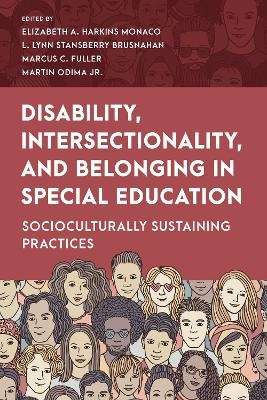
Disability, Intersectionality, and Belonging in Special Education
Rowman & Littlefield (Verlag)
978-1-5381-7582-8 (ISBN)
This book focuses on preparing culturally competent educators who use culturally sustaining practices and culturally relevant curricula and instruction to reach and teach all students with disabilities, including those with multiple social identities, through a varied multi-cultural lens.
Today’s diverse classrooms require that educators possess competencies for teaching all students. This book has two primary audiences:
1. Pre-service educators
2. Special education practitioners and administrators
First, this book will assist pre-service students learning about special education for students with disabilities. We fully expect this book could be a required reading for students majoring in special education, for school social work students, for school counselors, and for students majoring in vocational rehabilitation services as a part of their coursework for transition.
Second, this book will assist special education practitioners and administrators to meet the needs of individuals with disabilities including those with multiple social identities. Understanding the full-range of needs relating to cultural sustaining practices is imperative to working with individuals with disabilities and their families and care-givers. Being able to understand and explain this complex issue to others is important and often very necessary.
This book is incredibly timely. Recent contributors to social injustices are the COVID-19 pandemic and the continued issues around police brutality and people of color. Social injustice in special education is historical and systemic. Special education practitioners are typically unaware of the importance of intersectional differences (Gay & Howard, 2000; Owen, 2010). Historically, practitioners have only been prepared to address cultural perspectives during awareness days and or through specific units in curricula. Other times they discuss it diagnostically (Linton, 1998), such as part of an educational plan or a need to learn English as a second language.
Other issues stem from the value system of the special education practitioners themselves; some are not willing to engage in these concepts (Darling-Hammond, 2002); some “define fairness and equity as treating all children the same; and [others identify being] ‘colorblind’ [as] valuing diversity” (Owen, 2010, p. 18). Even when special educator practitioners attempt to address injustices on behalf of their students, they tend to center only on the student’s disability which means they are ignoring or erasing other aspects of their students’ identities.
These issues highlight the importance of building the cultural competence of our teaching force. This book will help practitioners build this competence in their own spheres of influence.
Elizabeth A. Harkins (Monaco), EdD, is an assistant professor in the Department of Special Education, Professional Counseling, and Disability Studies at William Paterson University. She is the current Director of the Autism Spectrum Disorder and Developmental Disabilities Advanced Masters Program. Dr. Harkins has extensive experience serving students with autism spectrum disorder (ASD) and intellectual and developmental disabilities (I/DD) in a variety of settings. Prior to entering academia, she worked for over a decade as a special education administrator, classroom teacher, and family advocate. Dr. Harkins’ scholarly interests focus on the critical importance of social justice pedagogy alongside educational excellence for all students. Some of her recent publications include manuscripts that examine the multiple, overlapping social identities for students with ASD and I/DD; the impacts of social injustices for individuals with disabilities; culturally sustaining practices; and intersectional pedagogy. L. Lynn Stansberry Brusnahan, PhD, is a professor in and Chair of the Department of Special Education in the School of Education at the University of St. Thomas in Minnesota. She coordinates the autism and developmental disabilities master’s programs. She is a private educational consultant and parent of an adult son with autism. She earned her doctorate at the University of Wisconsin-Milwaukee, where she studied contemporary educational issues within urban settings. She has served on the board of directors for the Autism Society of America and Council for Exceptional Children’s (CEC) Division on Autism and Developmental Disabilities (DADD). She co-authored Do-Watch-Listen-Say: Social and communication skills for autism spectrum disorder. Dr. Stansberry Brusnahan’s scholarly interests focus on autism and teacher preparation. In 2012, she was the Autism Society of America’s Professional of the Year. Marcus C. Fuller, PhD, is a visiting lecturer in the Department of Education at The University of Vermont. He earned his doctorate in special education at Texas A&M University. He has served teachers and parents from various ethnic backgrounds, socio-economic status, and age groups within urban and rural areas. Dr. Fuller's scholarly interests focus on empowering families, educators, and researchers by helping them increase their implementation skills during interventions with children with behavior disorders, autism, and/or complex communication needs through the use of educational coaching and performance feedback. Dr. Fuller has served as a reviewer for multiple journals and conference proposals as an active member of the Council for Exceptional Children’s (CEC), Division on Autism and Developmental Disabilities (DADD), and the Council for Children with Behavioral Disorders (CCBD).
| Erscheinungsdatum | 05.03.2024 |
|---|---|
| Reihe/Serie | Special Education Law, Policy, and Practice |
| Verlagsort | Lanham, MD |
| Sprache | englisch |
| Maße | 152 x 229 mm |
| Gewicht | 599 g |
| Themenwelt | Sozialwissenschaften ► Pädagogik ► Didaktik |
| Sozialwissenschaften ► Pädagogik ► Sonder-, Heil- und Förderpädagogik | |
| ISBN-10 | 1-5381-7582-7 / 1538175827 |
| ISBN-13 | 978-1-5381-7582-8 / 9781538175828 |
| Zustand | Neuware |
| Haben Sie eine Frage zum Produkt? |
aus dem Bereich


